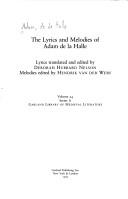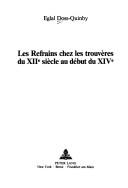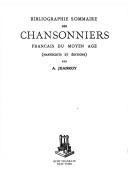| Listing 1 - 10 of 37 | << page >> |
Sort by
|

ISBN: 0824094204 Year: 1985 Publisher: New York
Abstract | Keywords | Export | Availability | Bookmark
 Loading...
Loading...Choose an application
- Reference Manager
- EndNote
- RefWorks (Direct export to RefWorks)
Book
Year: 1979 Publisher: University, Miss. : Romance Monographs, inc.,
Abstract | Keywords | Export | Availability | Bookmark
 Loading...
Loading...Choose an application
- Reference Manager
- EndNote
- RefWorks (Direct export to RefWorks)
Book
ISBN: 9780271087184 Year: 2020 Publisher: University Park, Pennsylvania : The Pennsylvania State University Press,
Abstract | Keywords | Export | Availability | Bookmark
 Loading...
Loading...Choose an application
- Reference Manager
- EndNote
- RefWorks (Direct export to RefWorks)
"A collection of new translations into English and modern French of all the songs and motets ascribed to the medieval poet-composer Robert de Reims. Includes the original texts, the extant melodies, and a substantive introduction"--
Trouvère songs --- Songs, Old French --- Motets --- Robert,
Book
ISBN: 0571100422 Year: 1981 Publisher: London Faber Music
Abstract | Keywords | Export | Availability | Bookmark
 Loading...
Loading...Choose an application
- Reference Manager
- EndNote
- RefWorks (Direct export to RefWorks)
Music --- middeleeuwen --- troubadoursliederen --- France --- French poetry --- Songs, Old French. --- Trouvère songs.
Book
ISBN: 9781843841647 1843841649 9781846156267 9786612621055 1846156262 128262105X Year: 2008 Publisher: Suffolk Boydell & Brewer
Abstract | Keywords | Export | Availability | Bookmark
 Loading...
Loading...Choose an application
- Reference Manager
- EndNote
- RefWorks (Direct export to RefWorks)
This study brings the songs of the 'trouvères' to an encounter with Lacanian psychoanalytic theories of signification, sexual difference and unconscious desire. In 'trouvère' song desire functions as a means of generic and 'genderic' differentiation. The 'trouvères' distinguished between sexual need or lust and desire, the latter usually confined to the masculine voice in high style. Less exalted persons, in whose company women were already implicitly included, appear as incapable of desire in the 'fin'amors' register. Critics have treated the issue of desire as represented in the courtly 'chanson' but, because criticism has followed the 'trouvères' distinction between desire and need, discussion of desire has been limited to songs in the courtly register rather than across the system of genres. Desire in Lacan's sense, that is unconscious desire, is present in all genres and voices and this book unearths the unspoken desires of 'trouvère' song by an attention to the characteristic means by which subjects subvert their demands in different genres. HELEN DELL is a research fellow in English Literary Studies in the School of Culture and Communication, University of Melbourne.
Trouvère songs --- History and criticism. --- Trouvère songs --- Desire in literature. --- Songs, Old French --- Trouvere songs

ISBN: 0820401536 9780820401539 Year: 1984 Publisher: New York (N.Y.): Lang,
Abstract | Keywords | Export | Availability | Bookmark
 Loading...
Loading...Choose an application
- Reference Manager
- EndNote
- RefWorks (Direct export to RefWorks)
French poetry --- Songs, Old French --- French language --- Civilization, Medieval, in literature --- Trouvères --- Refrain

ISBN: 0833718282 Year: 1971 Publisher: New York : Franklin,
Abstract | Keywords | Export | Availability | Bookmark
 Loading...
Loading...Choose an application
- Reference Manager
- EndNote
- RefWorks (Direct export to RefWorks)
Folk music --- Folk songs, Old French --- Manuscripts, Medieval --- History and criticism --- History and criticism --- Catalogs
Book
Year: 1969 Publisher: Wiesbaden : M. Sändig,
Abstract | Keywords | Export | Availability | Bookmark
 Loading...
Loading...Choose an application
- Reference Manager
- EndNote
- RefWorks (Direct export to RefWorks)
Folk-songs, Old French --- French literature --- Littérature française --- Texts
Book
ISBN: 180010989X Year: 2023 Publisher: Boydell & Brewer
Abstract | Keywords | Export | Availability | Bookmark
 Loading...
Loading...Choose an application
- Reference Manager
- EndNote
- RefWorks (Direct export to RefWorks)
A translation of three works from the second half of the 13th century: Rutebeuf's Renart le Bestourné, the anonymous Le Couronnement de Renart and Jacquemart Gielée's Renart le Nouvel. These savage and highly entertaining satires are in a league of their own, and Renart le Nouvel contains important music which is reproduced in the text.Rarely can a medieval work have resonated with the mood of the present as uncannily as do these three satires. Acerbic, raging and finally apocalyptic, these poems from the second half of the thirteenth century, richly entertaining and wickedly comic though they are, express a vision of the world and its descent into corruption and disaster which mirrors our own state of rampant alarm.The animal tales of the 12th- and 13th-century Roman de Renart - the Romance of Reynard the Fox - were immensely popular. Any satire in those original tales was generally light of touch, but the characters created in them, fox and wolf and ass and lion to name but four, were an open invitation to anyone of a more scathing satirical bent. The poet Rutebeuf, in his short but startling Renart le Bestourné ('Reynard Transformed'), deploys the beasts to make a venomous attack on the mendicant orders and on 'Saint' Louis IX of France. The anonymous Le Couronnement de Renart ('Reynard Crowned') then has the Fox crowned king, establishing a reign of every vice. And most ambitiously of all, Jacquemart Gielée in his Renart le Nouvel ('The New Reynard'), gripped by an increasingly pervasive sense of apocalypse, ends his poem with the Fox, the epitome of deceit and lying, not merely crowned king, but seated in permanent, malign control of the world atop a chocked, unturning Fortune's Wheel.The New Reynard is of special interest not only to students of medieval literature but also to musicologists. Music, in the form of numerous songs, plays an important part in Renart le Nouvel's satirical and apocalyptic message, and the poem is renowned as the most abundant source of late medieval refrains. The notations have survived, and the music is edited in this volume by Matthew P. Thomson.
Foxes --- Songs, Old French --- French poetry --- Verse satire, French --- Reynard, --- To 1500
Book
Year: 1956 Volume: 1/2 Publisher: Darmstadt : [s.n.],
Abstract | Keywords | Export | Availability | Bookmark
 Loading...
Loading...Choose an application
- Reference Manager
- EndNote
- RefWorks (Direct export to RefWorks)
Mensural notation. --- Mensural notation. --- Music theory --- Musical notation --- Songs, Old French --- Théorie musicale --- Musique --- History --- Histoire --- Notation
| Listing 1 - 10 of 37 | << page >> |
Sort by
|

 Search
Search Feedback
Feedback About UniCat
About UniCat  Help
Help News
News